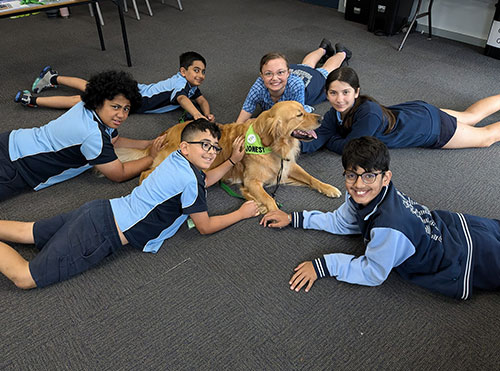
Our Blog
A Reflection on Our 8-Week School Programs.

Canine therapy has emerged as a transformative approach to supporting children's emotional and social development. A recent study by Maya Schwartz Laufer, Ph.D., titled "Canine Interventions: Empowering Children in Eight Canine Therapy Sessions," offers valuable insights into how structured canine interactions can significantly impact. This aligns closely with our work at Canine Comprehension through our 8-week school programs.
Key Takeaways from the Study
Laufer's research explores the therapeutic potential of animals, particularly dogs, in educational settings. The study involved children from diverse backgrounds, including those with autism, and highlighted several benefits:
1. Emotional Regulation:
Therapy dogs helped children manage emotions, reducing anxiety and promoting calmness. This is crucial for students who struggle with emotional dysregulation.
2. Social Skills Development:
Children learned to interact positively with peers and adults, focusing on eye contact, tone of voice, and body language—essential components of effective communication.
3. Building Confidence:
Engaging with therapy dogs boosted children's confidence, helping them overcome fears and develop a sense of accomplishment.
4. Inclusion and Acceptance:
The study underscored the importance of inclusion, showing how therapy dogs can break down barriers and promote acceptance among students with different needs.
Our 8-Week School Programs
At Canine Comprehension, our programs mirror these successful elements, ensuring each session is impactful and engaging. Here's how our offerings align with Laufer's findings:
1. Communication on the Inside & Out:
Tailored for students with ADHD, ASD, and anxiety, this program focuses on verbal and non-verbal communication, helping students understand and manage their emotions. Therapy dogs teach patience, empathy, and resilience.
2. Friendship & Responsibility:
By fostering relationships with therapy dogs, students learn about empathy and responsibility. This program supports social-emotional learning, encouraging students to form meaningful connections with peers.
3. Reading Tails:
Designed to boost literacy, this program creates a supportive environment for reluctant readers. Therapy dogs provide comfort, reducing anxiety and encouraging a love for reading.
4. Flexible Thinking:
Encouraging adaptability, this program helps students embrace change and develop problem-solving skills, echoing the adaptability highlighted in Laufer's study.
The Broader Impact
Laufer's study emphasises that therapy dogs can significantly enhance the educational experience by creating a nurturing environment where children feel safe and supported. Our programs at Canine Comprehension are built on this foundation, aiming to provide students with the tools they need to succeed academically and personally.
By integrating therapy dogs into our sessions, we address students' immediate needs and equip them with lifelong skills. The positive outcomes observed in Laufer's study reinforce the value of our approach, highlighting the transformative power of canine-assisted learning.
For more information about our programs and how they can benefit your school, please visit our schools activity page.
Reference:
Laufer, M. S. (2023). Canine Interventions: Empowering Children in Eight Canine Therapy Sessions. International Journal of Scientific Research. Retrieved from ResearchGate
